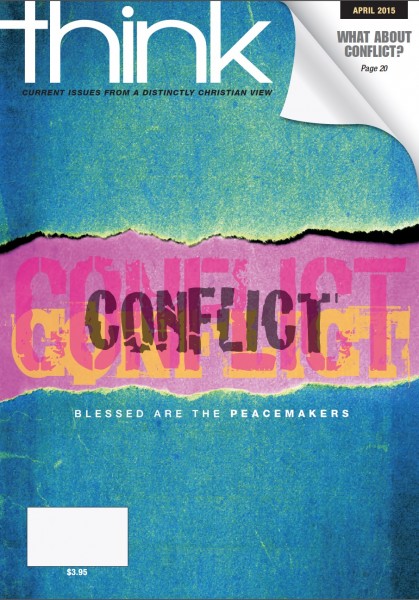I recently saw a post online that depicted Christ cleansing the Temple. In the picture, Jesus was brandishing a whip as he overturned tables and drove the money changers away. The caption below commented that many preachers today would counsel Christ that, “Jesus would never do anything like that. After all, God is love and Jesus loves us all.” Really? It looks exactly like the mental picture I draw when I read of the Temple cleansing. Yes, Jesus was involved in conflict—often.
And so are we. Almost every family and congregation deals with stress and conflict. Whether the source is Aunt Esther and her constant complaining about how everyone else is a hypochondriac, or Uncle Bill and his never-ending debates about politics, or Nellie and her constant challenging the traditions of the family, or Mom and Dad at odds over budget issues, or little Bobby and little Cody vying for attention, or even something as simple as which songs to sing on Sunday morning and how many verses to sing of each one, every family experiences pretty much the same stressors in life. So, how do we maintain peace and unity in the face of so much chaos? There are some basic principles of “peace making” that are applicable both in our homes and churches.
First, we need to realize that nobody is perfect. While this seems to be a simple fact, it becomes that much more complicated when we multiply our imperfections five, ten, or even a hundred times over. Since families are made up of imperfect people, the potential for conflict from combining and multiplying so many differing imperfections rises exponentially. So, we must begin with the knowledge that families and churches are simply groups made up of flawed individuals who may or may not recognize their own imperfection. So, having realized this first understanding, how do we avoid the inherent conflicts and handle those we cannot avoid?
I believe the foundation for peace and contentment is love. Love is the key to personal and relational satisfaction, and is essential to happiness. In addition, love has a distinct and inherent quality that precludes conflict and leads toward resolution. Love is what caused God to send His Son to die on our behalf and the power that held Jesus on the cross. Love is what launched the twelve Apostles out into a world that had no hope without the message of Jesus. Love is why churches have built schools, universities, hospitals, missions, and communities. Love is what causes us to seek and save the lost and at the same time, what gives us a reason to come home at the end of a weary day. Perhaps if we could teach our families the basic principles Paul taught the Roman church, we would find an answer not just for resolution of disputes, but also for avoiding most disputes:
“What then shall we say to these things? If God is for us, who can be against us? He who did not spare His own Son, but delivered Him up for us all, how shall He not with Him also freely give us all things? Who shall bring a charge against God’s elect? It is God who justifies. Who is he who condemns? It is Christ who died, and furthermore is also risen, who is even at the right hand of God, who also makes intercession for us.” (Romans 8:31-34)
If we were to first realize that we and everyone we deal with is basically flawed and no one is perfect, and then further realize that they are children of the same Heavenly Father we serve, we can learn to practice sacrificial love toward others. After all, as Paul was clear to say, we cannot bring ANY charges against the elect of God; because God, Himself, justifies them.
Additionally, James wrote, “Where do wars and fights come from among you? Do they not come from your desires for pleasure that war in your members?” (James 4:1) Do you see what he is saying here? Conflicts arise because we put our will, our desire, our morality, our whatever ahead of someone else. The obvious way to avoid conflict is to put others ahead of ourselves, but that is not always easy.
So how do we do it? How do we put others first? How do we live by these principles? First and foremost we need to realize that we are dead. Paul tells us that we were united with Christ in death, that our old self died, and that we are raised to walk a new life (Romans 6:2-4). He later goes on to write that we are crucified with Christ and that the life we live now is not ours but His! (Romans 6:6; Galatians 2:20) We are dead —crucified with Christ and raised to walk in a new way—led by the Spirit of God—with our minds renewed and our personal will under control.
You see, if we are dead, we cannot be hurt by what others do or say. Have you ever heard a dead person say, “I’m offended by what you said about me.” or “That really hurts when you step on my toes”? Of course not. Why not? Because they are dead. They have no feelings to hurt, no emotions to stir, and no pride to protect. If we have died with Christ then our emotions and feelings and whatever else causes strife died with us.
When we finally understand this, we will be more prone to allow Jesus to live through us and produce love, joy, peace, patience, kindness, goodness, faithfulness, gentleness, and self-control. When we realize these things, our relationships change. Paul David Tripp identifies three keys for having relationships that mirror the love that God has for us in his book, Instruments in the Redeemer’s Hands. They are: (1) He (God) has a higher role for our relationships than our personal happiness. (2) He (God) wants our relationships to be the context for the change He works in and through us. (3) We need to build relationships that encourage this work of change.
Does all of this mean that we will not or should not ever have any conflicts? Again I would point out that Jesus’ life was filled with controversy. He drove the money changers out. He openly addressed the hypocrisy of the Pharisees. He pointed out that the Saducees were in error for not knowing the scriptures. He stood up to the scribes and those who accused him of breaking the Sabbath and eating with sinners. He ignored Jewish traditions and spent time talking to women and small children and Samaritans. He openly challenged the High Priest with the things he said about being the son of God. He told Pilate that he (Pilate) would have no power if it hadn’t been granted him.
But, the key difference between His conflicts and ours is that He never allowed the controversy to be about him. He always was more interested in God’s will than his own glory or honor. Not one time in all of the Gospel accounts do you see Jesus angered by what people said about or did to him. So in the midst of his greatest struggle, he didn’t answer when they bore false witness against him, didn’t fight to free himself, and even turned the other cheek when they slapped him, spit on his face and pulled out his beard. Even as he hung on the cross in agony with people mocking him and daring him to fight back, his heart went out to those who were responsible—asking God to forgive them as they had no idea what they were doing.
I remember when my son was learning the beatitudes in Bible Class. He came in so proud as he quoted to me, “Blessed are the pace makers.” All these years later, I am constantly reminded of the need for “pace makers” in the family. When the only exercise some of us get is from jumping to conclusions and running outers down, we all need “pace makers” just to keep our heartbeats regulated and keep the peace. Sound familiar? Maybe we all need to slow down and regulate our pace just a little bit and appreciate the blessings of family in spite of the challenges raised by so many different personalities. These principles can make all the difference for a happy home or even for a happy congregation
By George Hulett
This article appears in the April 2015 issue of Think magazine. To subscribe to Think or for more information, click the tab above.
What About Conflict?




